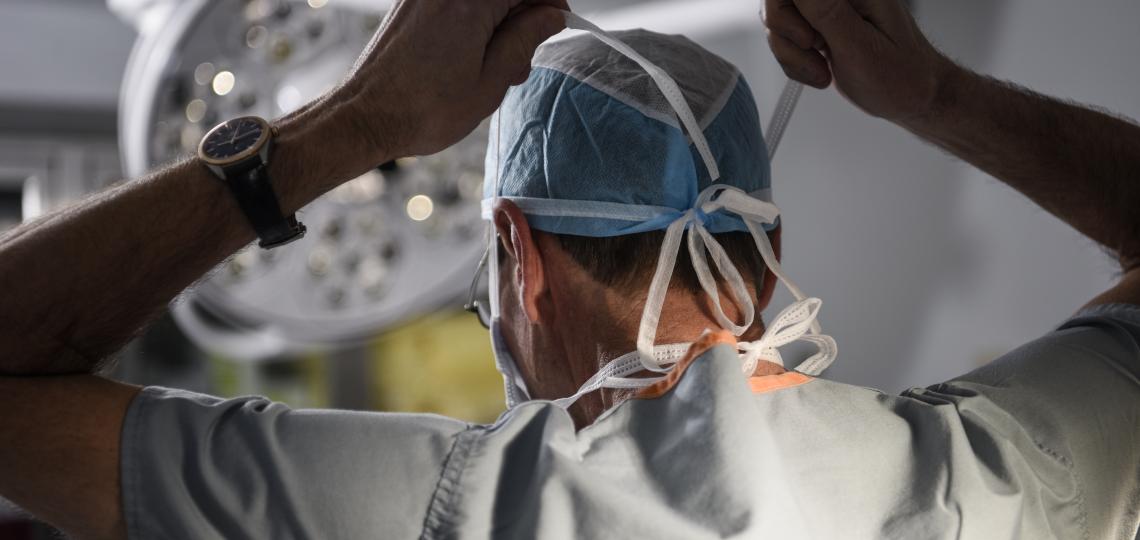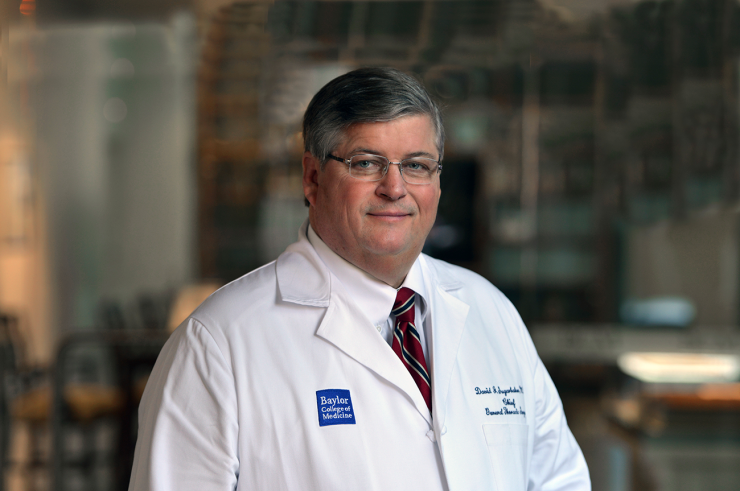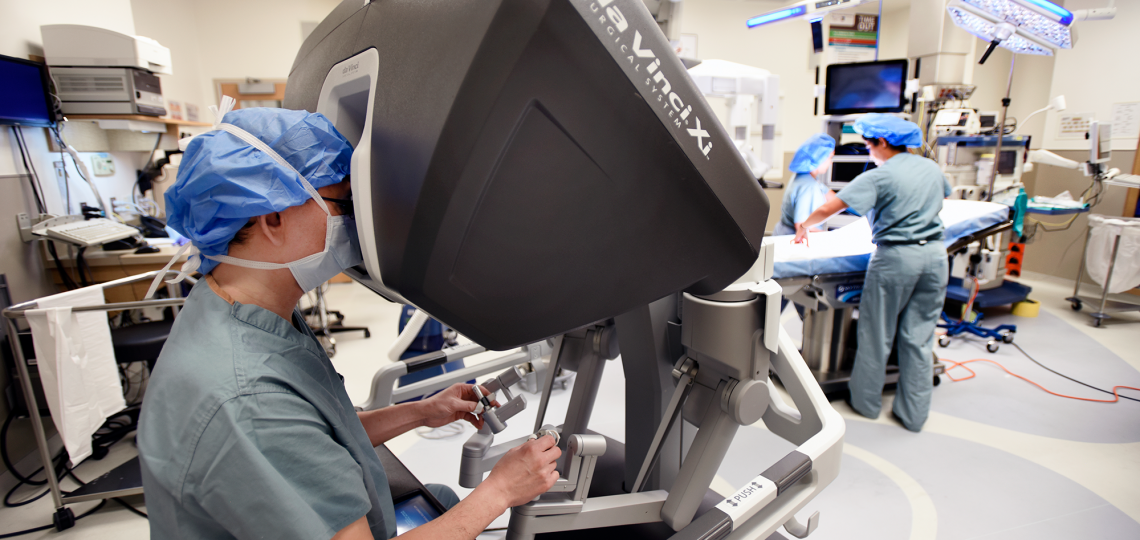
About the Program
The Texas Heart Institute/Baylor College of Medicine Thoracic Surgery (Independent) Fellowship Program has a pioneering tradition and a continuing spirit of innovation in cardiothoracic surgery. The Thoracic Surgery (Independent) Fellowship is a three-year program, accepting three fellows per year, and is one of the largest in the U.S. In addition, a six-year Thoracic Surgery Integrated Residency Program accepts one resident per year. With core rotations at renowned Texas Medical Center institutions, part of the largest medical center in the world, the fellowship and residency programs provide a diverse and comprehensive experience in all aspects of thoracic surgery under the direction of program director Dr. Ravi K. Ghanta, associate program directors Dr. Shawn S. Groth, and Dr. Vicente Orozco-Sevilla and assistant program director Dr. Alexander Schutz. As part of the Michael E. DeBakey Department of Surgery, the training program is able to enjoy further support from department of surgery chair Dr. Todd K. Rosengart.
The program's core values are integrity, respect for the individual, continuous commitment to excellence, dedication to discovery/innovation, and fostering leadership through education and teaching, mirroring values instilled by program founders Dr. Michael E. DeBakey and Dr. Denton A. Cooley. These values are expressed through a program providing comprehensive training in adult and pediatric thoracic and cardiac surgery in an environment that stresses clinical excellence, clinical and basic research, and teaching as long-term goals for graduates.
History
Under the leadership of many world-renowned surgeons, Baylor College of Medicine and the Texas Heart Institute have a storied tradition of excellence and innovation in cardiovascular and thoracic surgery. Dr. Michael E. DeBakey was professor and chair of the Department of Surgery at Baylor College of Medicine from 1948 to 1993 and is considered by many to be the founding father of cardiovascular surgery. Many of the devices, instruments and techniques that he developed serve as the foundation of modern surgical techniques.
Contributions attributed to Dr. DeBakey include the first performance of carotid endarterectomy (1953), excision and homograft replacement of an aneurysm of the abdominal aorta (1954), aortocoronary artery bypass (1964), and use of a left ventricular bypass pump (1966). Dr. Denton A. Cooley founded Texas Heart Institute in 1962 and is known for performing the first successful human heart transplant in the United States (1968) as well as the first clinical implants of mechanical circulatory support devices - total artificial hearts (1969 and 1981) and a left ventricular assist device (1978) - as bridges to heart transplantation. He and Dr. DeBakey partnered together in devising and performing many of the key aortic procedures that were innovated at Baylor in the 1950s. Other important contributions of Dr. Cooley include developing techniques for repairing diseased heart valves, congenital cardiac anomalies, and aortic and ventricular aneurysms. Dr. E. Stanley Crawford advanced many of the Baylor aortic procedures over succeeding decades, a tradition of excellence in the management of aortic pathology that has been continued by Dr. Joseph S. Coselli, who has performed greater than 3500 thoracoabdominal aneurysm repairs - more of these operations than anyone in history.

In 2014, Dr. David J. Sugarbaker, a master thoracic surgeon and internationally recognized thought leader, was recruited to join the faculty at Baylor College of Medicine as founding chief of the Division of General Thoracic Surgery and founder director of the Baylor College of Medicine Lung Institute. Dr. Sugarbaker established new surgical approaches for the management of mesothelioma and fostered innovative surgical approaches to benign and malignant thoracic disease, which continues in the Division today.
The David J. Sugarbaker, M.D. Division of Thoracic Surgery Endowed Fund has been created to support the training of future thoracic surgeons to carry on his legacy.
To be eligible to apply, candidates must have successfully completed five years of an ACGME-accredited general surgery residency program and be eligible for examination by the American Board of Surgery. We match two cardiothoracic track fellows and one general thoracic track per year for our three-year program. Our cardiothoracic surgery track provides a comprehensive experience in all aspects of cardiothoracic surgery, including complex aortic surgery, robotic cardiac and general thoracic surgery, heart and lung transplantation, mechanical circulatory support, and structural heart/transcatheter interventions. Our thoracic surgery track includes fifteen months of focused general thoracic/ thoracic oncology rotations at Baylor St. Luke’s Medical Center and MD Anderson Cancer Center. Additional general thoracic oncology experience is gained during nine months of cardiothoracic rotations at the Michael E. DeBakey Veterans Affairs Medical Center and the Ben Taub Hospital. Importantly, due to high case volumes, trainees in either training track can attain ABTS required numbers for both general thoracic surgery or cardiothoracic surgery training.
Our training program emphasizes the central role of the fellows in the management of cardiothoracic surgery patients with hands-on operative experience. It strives to provide training in contemporary, cutting-edge technologies, participation in research, and interaction with thought leaders in cardiothoracic surgery.

Clinical Volume
In addition to institutional, faculty, and patient diversity, clinical volume is a strength of the cardiothoracic training program. Annually our trainees have an opportunity to participate in the more than 1,700 adult cardiac surgery cases that are performed at our hospital affiliates, including more than 150 VADs and heart/lung transplants and more than 200 complex aortic reconstructions. Structural heart exposure includes 350 TAVRs per year and more than 50 Mitraclip procedures per year. Robotic cardiothoracic surgery continues to grow rapidly, with more than 200 robotic cases performed in 2019. Robotic operations include MIDCAB, mitral valve replacement, mitral valve repair, thymectomy, lobectomy esophagectomy, anti-reflux surgery, and thoracic outlet. Exclusive of MD Anderson, 860 thoracic and esophageal cases are performed annually. In addition, 1,075 congenital heart operations are performed annually at Texas Children’s Hospital.








 Credit
Credit
